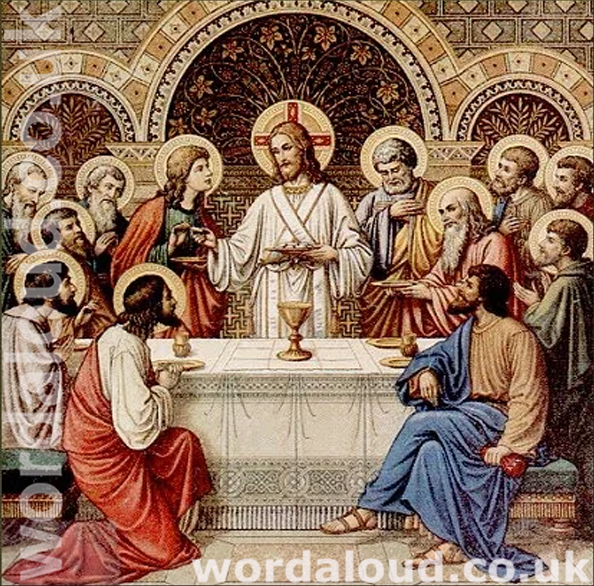Christian Art | Life Of Jesus | Eucharist | The Last Supper
Office Of Readings | Week 22, Sunday, Ordinary Time | A Reading From The Sermons Of Saint Augustine | The Lord Has Had Mercy On Us
‘The Lord has had mercy on us.’
Saint Augustine’s sermon explores the relationship between divine grace and human works. He begins by stressing the importance of living according to what is heard and sung in worship: the word of God should not only be received but should bear fruit in deeds. Hearing is like planting a seed, but only action demonstrates that the seed has grown.
The apostle Paul’s words in Ephesians 2:8–9 are central: salvation comes by grace, not by works, so that no one may boast. Augustine insists that human life prior to God’s intervention was displeasing to him. God did not respond to human goodness but to human need. Grace comes not as a reward but as a gift, unmerited and freely bestowed.
This is illustrated by Romans 5:6–8: Christ died not for the righteous but for the ungodly. Augustine highlights the contrast: one might find someone willing to die for a good person, but Christ died for sinners. This act reveals both the depth of human unworthiness and the extent of divine mercy. The language of redemption — Christ as the spotless lamb who sheds his blood — draws on sacrificial imagery from 1 Peter 1:18–19 and the Passover lamb of Exodus.
The sermon then shifts to exhortation. Believers must live in a way worthy of the grace received, not returning to sin but showing gratitude to the divine physician who heals. Sin after receiving grace is portrayed as a relapse into sickness and as ingratitude for the cure already given.
Above all, Augustine points to humility as the path that Christ revealed and embodied. The Incarnation itself — ‘the Word became flesh’ (John 1:14) — is presented as the supreme act of humility: the immortal one taking on mortality. Christ’s death is both sacrifice and victory, destroying death by dying, and his resurrection raises humanity with him. Thus humility is not weakness but the path to exaltation, for Christ himself was humbled before being raised in glory.
The piece concludes by calling believers to follow this same path. To remain in humility is to remain in Christ, confessing faith and offering praise. For Augustine, true worship is not merely words or songs but a life that reflects gratitude for grace and participation in Christ’s humility.

A Reading From The Sermons Of Saint Augustine | The Lord Has Had Mercy On Us
Happy are we if we do the deeds of which we have heard and sung. Our hearing of them means having them planted in us, while our doing them shows that the seed has borne fruit. By saying this, I wish to caution you, dearly beloved, not to enter the Church fruitlessly, satisfied with mere hearing of such mighty blessings and failing to do good works. For we have been saved by his grace, says the Apostle, and not by our works, lest anyone may boast; for it is by his grace that we have been saved. It is not as if a good life of some sort came first, and that thereupon God showed his love and esteem for it from on high, saying: ‘Let us come to the aid of these men and assist them quickly because they are living a good life.’ No, our life was displeasing to him. He will, therefore, condemn what we have done but he will save what he himself has done in us.
We were not good, but God had pity on us and sent his Son to die, not for good men but for bad ones, not for the just but for the wicked. Yes, Christ died for the ungodly. Notice what is written next: One will hardly die for a righteous man, though perhaps for a good man one will dare even to die. Perhaps someone can be found who will dare to die for a good man; but for the unjust man, for the wicked one, the sinner, who would be willing to die except Christ alone who is so just that he justifies even the unjust?
And so, my brothers, we had no good works, for all our works were evil. Yet although men’s actions were such, God in his mercy did not abandon men. He sent his Son to redeem us, not with gold or silver but at the price of his blood poured out for us. Christ, the spotless lamb, became the sacrificial victim, led to the slaughter for the sheep that were blemished – if indeed one can say that they were blemished and not entirely corrupt. Such is the grace we have received! Let us live so as to be worthy of that great grace, and not do injury to it. So mighty is the physician who has come to us that he has healed all our sins! If we choose to be sick once again, we will not only harm ourselves, but show ingratitude to the physician as well.
Let us then follow Christ’s paths which he has revealed to us, above all the path of humility, which he himself became for us. He showed us that path by his precepts, and he himself followed it by his suffering on our behalf. In order to die for us – because as God he could not die – the Word became flesh and dwelt among us. The immortal One took on mortality that he might die for us, and by dying put to death our death. This is what the Lord did, this the gift he granted to us. The mighty one was brought low, the lowly one was slain, and after he was slain, he rose again and was exalted. For he did not intend to leave us dead in hell, but to exalt in himself at the resurrection of the dead those whom he had already exalted and made just by the faith and praise they gave him. Yes, he gave us the path of humility. If we keep to it we shall confess our belief in the Lord and have good reason to sing: We shall praise you, God, we shall praise you and call upon your name.
Christian Prayer With Jesus
Lord God,
you have shown mercy to us through your Son,
who died for the ungodly and gave himself as the spotless lamb.
Grant that we may live in the grace we have received,
walking the path of humility revealed by Christ,
so that our words of praise may be joined with deeds of faith.
Through the same Christ our Lord,
who lives and reigns with you in the unity of the Holy Spirit,
God for ever and ever. Amen.
Glossary Of Christian Terms
Saint Augustine (354–430) – Bishop of Hippo in North Africa, one of the most influential Fathers of the Church, known for his sermons, writings, and theological reflections on grace, sin, and salvation.
Grace – The free and undeserved gift of God’s love and mercy, by which humans are saved and transformed.
Ephesians 2:8–9 – A Pauline text emphasising salvation by grace through faith, not by works.
Romans 5:6–8 – Paul’s teaching that Christ died for the ungodly, showing God’s love for sinners.
Redemption – The act of being freed from sin and death through the sacrifice of Christ.
Passover Lamb – Old Testament image (Exodus 12) of a lamb sacrificed to mark deliverance from Egypt, interpreted by Christians as fulfilled in Christ’s sacrificial death.
Incarnation – The Christian belief that the Son of God became human in Jesus Christ (‘the Word became flesh’).
Humility – The attitude of lowering oneself, exemplified by Christ in his Incarnation and Passion, seen by Augustine as the path to exaltation.
Divine physician – A common early Christian metaphor for Christ as healer of the sickness of sin.
Exaltation – The raising of Christ in the resurrection and ascension, and the promised raising of believers with him.







